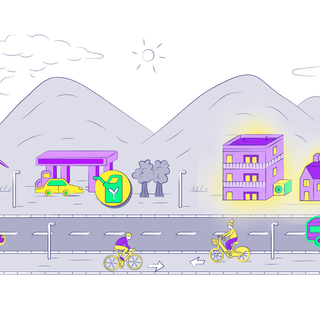


How France needs to radically transform its energy system
In DepthFighting against climate change implies major transformations over the next decade: electrifying, developing renewable energies and decreasing energy consumption.
France's energy system is about to undergo an unprecedented revolution. In fewer than 30 years, everything must change: no more oil and gas imports; a lot more solar panels, wind turbines and bio-energies. Gone will be the gas stations and oil-fired boilers, replaced by electric vehicles, bicycle paths, and heat pumps. Many of the current nuclear power plants will be shut down, due to their age, and new reactors may have begun operating.
Almost all of the facilities that will be producing energy in 2050 don't exist today. Is this radical transformation absolutely necessary? And is it inevitable?
The answer is yes, if we want to combat climate change, fulfill our commitments, and achieve carbon neutrality by 2050. To do this, we need to reduce our greenhouse gas emissions as much as possible. In France, the energy sector is responsible for around 80% of these emissions. And fossil fuels, which are at the root of the climate crisis, currently account for 63% of the country's energy consumption.
To move away from coal, oil and gas, we need a complete transformation. It must start now, and the next 10 years will be particularly decisive.
1 - WHY THE FUTURE WILL BE ELECTRIC
There is one path toward decarbonisation on which everyone agrees: the need to electrify. Combustion-engine cars must be replaced by electric vehicles, gas-fired boilers by heat pumps, and coal-fired blast furnaces by electric furnaces.
"Electrification is one of the most important strategies for reducing CO2 emissions from energy," the International Energy Agency has stated.
Electricity has several advantages: It is more efficient than fossil fuels, it can be used in most sectors and it is easy to decarbonize.
Although it may seem omnipresent in our daily lives, it actually accounts for only a quarter of our energy consumption. This share is set to rise sharply: It could account for 35% of consumption by 2030, according to RTE, the operator of France's electricity grid, and more than 55% by 2050. The government is anticipating to reach 31% by 2030.
The next stage of the electrification of France is already underway: In 2022, 13% of new vehicles sold were electric, compared with less than 2% in 2019, and sales of heat pumps have increased by 30% compared with 2021. But there's still a long way to go. Electric cars currently account for 1% of the car fleet, and while the government lists around 2.6 million air-to-water heat pumps, France also has some 12 million homes heated with gas and 3 million with oil.
You have 75% of this article left to read. The rest is for subscribers only.
